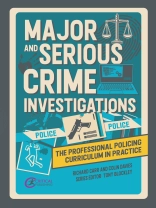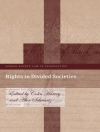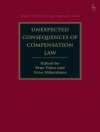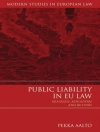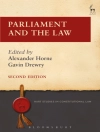This text explores the concept of major and serious crime investigations as it takes the reader through the fundamental elements of investigative theory and practice that are relevant to this area of criminality.
Unlike other texts that concentrate on either bespoke areas of criminality such as homicide, terrorism or tends in concepts such as county lines, this book recognises that the reader will be new to investigative study with little practitioner experience to anchor their learning. By using the latest evidence-based policing knowledge and critical thinking, it explores the concepts of major and serious crime, detailing key areas of legislation and how investigative strategies and decision making can influence successful outcomes. Other topics examined in this text is the key areas of risk for major and serious crime investigations, the impact on investigators, the concept of disclosure, investigative interviewing and how civil orders, designed to tackle this type of criminality can provide a successful alternative to prosecution.
Both students and practitioners can find this book useful with this book’s contemporary approach of using case studies and contemporary investigative examples relevant to the topic. This book brings together academic theory and operational understanding of major and serious crime that provides learners with an easy to follow guide that they can keep returning to throughout their career.
Зміст
Chapter 1: Introduction to major and serious crime investigations
Chapter 2: Principles of major and serious crime investigations
Chapter 3: Management of major and serious crime.
Chapter 4: Roles and responsibilities of the Crown Prosecution Service.
Chapter 5: Disclosure
Chapter 6; Digital material
Chapter 7: Covert approaches to the investigation of major and serious crime
Chapter 8: Investigative interviewing
Chapter 9: The use of civil orders in major and serious crime
Про автора
Tony Blockley has served within policing for over 30 years, gaining extensive knowledge and understanding of policing organisation and practice. On retirement he had attained the rank of Chief Superintendent with the position of Head of Crime, responsible for leading 500+ multi-disciplinary staff within a complex and critical department servicing public protection, major and serious crime, serious and organised crime, terrorism, financial crime, fraud and forensic services.
As the lead for policing at Leeds Trinity University he is responsible for co-ordinating policing higher education, including developing programmes and enhancing current provision in line with the Police Education Qualification Framework (PEQF) while also supporting the College of Policing in the development of programmes.
He combines an extensive policing career with an understanding of the national curriculum, the requirements of the academic standards and the entry routes to policing, giving him a unique perspective and the necessary credibility to support his role as Editor of Critical Publishing’s new policing series.
